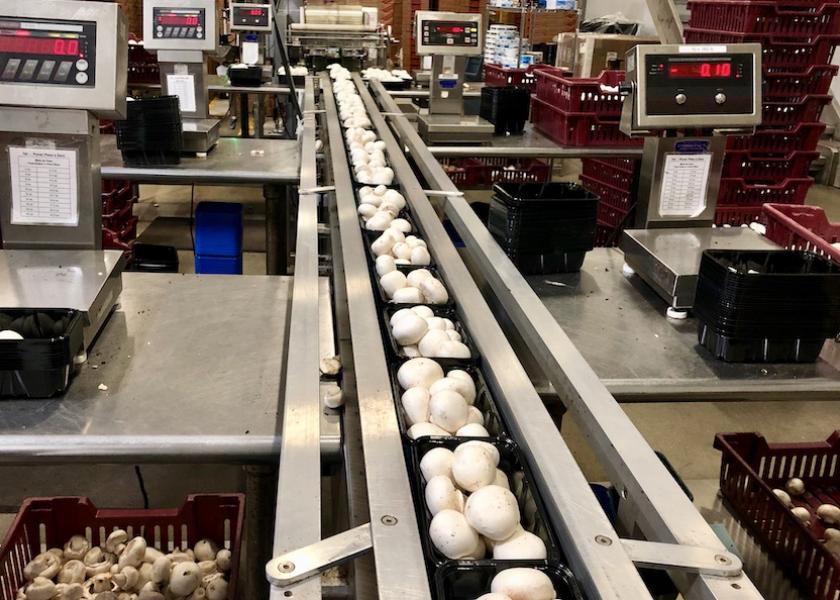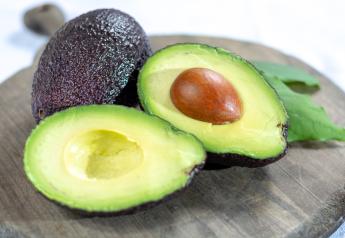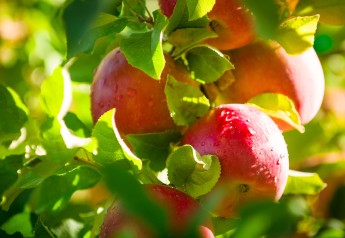Mushroom demand increases

Samantha Snyder is planning for growth this year and increasing capacity to keep up with current mushroom customers.
“Mushrooms are trending up, and we are planning for a steady increase in demand,” said Snyder, national account manager of Avondale, Pa.-based To-Jo Mushrooms, a fourth-generation family farm.
- The value of mushroom sales was $1.15 billion, up 3% from previous season, according to U.S. Department of Agriculture research released Aug. 31.
- Volume of sales of the 2019-20 U.S. mushroom crop was 816 million pounds, down 2% from last season.
- The average reported price was $1.41 per pound, up 7% from the previous year, according to the USDA.
- U.S. fresh market sales of agaricus mushrooms (white button) totaled 741 million pounds, down 1% from the previous season.
- Pennsylvania is the largest mushroom-producing state, followed by California.
- Agaricus growers in Chester County, Pa., produced 380 million pounds, a decrease of 4% compared with the 2018-2019 growing season.
“Since the pandemic began, we noticed, as The Mushroom Council, that sales went up in the double digits and stayed that way,” said Eric Davis, who handles media relations for the council.
“Compared to year over year, we were among the largest percentages in growth of any item in the produce aisle.”
He attributes the increase to The Blend promotions the past several years, which first focused on fine-dining chefs and Bon Appetit magazine, then fast-casual dining, followed by home cooks, and this spring will go more mainstream with a Food Network partnership.
The Blend encourages mixing minced mushrooms with meat in burgers, meatloaf, tacos, pasta sauce and other dishes as a way to add more savory flavor, more nutrition, be more sustainable and save money.
Yet even mushrooms weren’t immune to the 2020 rollercoaster of supply and demand.
Adjusting supply to meet shifting demand has always been a calculated guess requiring a forecast at least 10 weeks in advance. But usually, growers can use the trends of previous years as a guide.
“Historical data is difficult to rely on in 2021,” said Sean Steller, director of business development at Phillips Mushroom Farms, Kennett Square, Pa.
“We are keeping a very close eye on daily order flow by region and adjusting as needed.”
Retail demand should stay strong through 2021, with wholesale demand rising if or when foodservice resurges in the second or third quarter, Steller said.
Foodservice business that picked up in the summer is dropping again as restrictions return this winter, said Bruce Knobeloch, vice president of marketing and product development at Watsonville, Calif.-based Monterey Mushrooms Inc.
“That’s really made the whole need to stay very, very close to your customers and what their forecasted demand is, so we have the ability to have the right product at right time for our retail, club and foodservice customers,” Knobeloch said. “The process is the same. The sense of urgency is different.”
But overall, the trends point in a good direction for mushroom growers.
“With so many trends — plant-based eating, immune health and home cooking — it’s a category that retailers can look to promote,” said Stephanie Myles, marketing manager at Highline Mushrooms, Leamington, Ontario.
COVID-19 Effect
Like other specialty produce commodities, mushroom growers that relied on retailers for at least half of their customer base were able to use some of that rising sector to offset the drop in other sectors — namely, foodservice.
Toughkenamon, Pa.-based First Generation Farms sells mostly to wholesalers, rather than retailers, and doesn’t always know who the end customer is.
“That was probably most challenging part when COVID hit, with foodservice and restaurants and schools and airports closed,” said Sonya Beltran, director of operations.
“We, like others, got hit very hard. We sell to the middleman, not the end user, and that may go to a restaurant. March through June or July was tough. Customers were like, ‘We’re closing.’ I get it.”
The first two months of the pandemic, Beltran had to let a lot of mushrooms go.
“Oh my gosh, we steamed off good rooms when COVID hit. We donated as much as we could. There was just so much,” she said.
When a mushroom grower finishes harvesting, they steam off the mushroom beds at 145-150 degrees Fahrenheit to kill leftover bacteria. First Generation Farms pays a company to dispose the spent compost, which is usually then mixed for fertilizer and sold at stores or to other types of growers.
To adjust, Beltran said the company stretched out filling the 50 grow houses, from filling at least one house every other day, to one house a week.
“We make sure we harvest every single day, and we did. Everybody worked the same. Nobody was laid off,” she said.
Ten months into the pandemic, First Generation’s house-fill rate increased to twice, sometimes three times a week. The previously roller coaster-like demand is slowly becoming more consistent.







